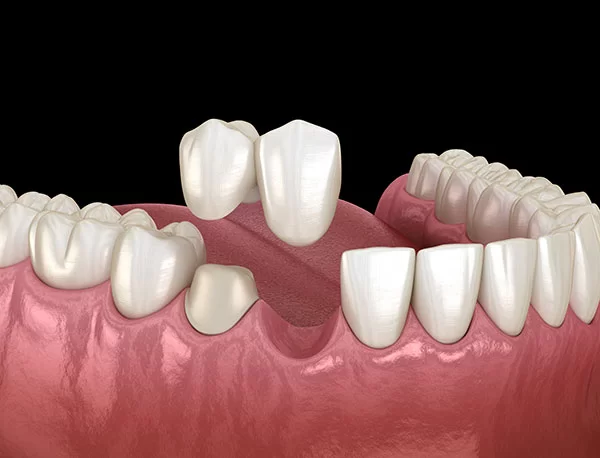Please note we may not offer this service at our office. Call our Wilmington dental office at (302) 999-7600 or our Seaford dental office at (302) 536-7589 to learn more.
Find Your Perfect Tooth Replacement Solution Near You
When you’re missing teeth, finding the right replacement option is crucial for maintaining your oral health and confidence. Cantilever dental bridges offer an innovative approach to replace missing teeth, especially when traditional bridges aren’t suitable. Unlike conventional dental bridges that require support from both surrounding teeth, cantilever bridges provide an effective solution by anchoring to just one adjacent tooth.
Our experienced dentists in Wilmington and Seaford, Delaware, explain what are advanced cantilever bridge procedures are. Contact our Wilmington dental office at (302) 999-7600 or our Seaford dental office at (302) 536-7589 today to discover if cantilever bridges are the right choice for your dental health needs. We serve patients throughout Pike Creek, Dover, and surrounding Delaware communities.
What Are Cantilever Dental Bridges?
A cantilever dental bridge is a specialized tooth replacement option designed to replace missing teeth when only one supporting tooth is available. Unlike traditional bridges that rely on abutment teeth on both sides of the gap, cantilever bridges attach to a single healthy tooth adjacent to the missing tooth space.
This innovative dental restoration consists of an artificial tooth (pontic) connected to a dental crown that covers the supporting tooth. The abutment tooth provides the necessary strength to support the replacement tooth, making it an ideal solution when neighboring teeth on one side aren’t suitable for bridge support.
Modern cantilever bridges are crafted from high-quality materials, including ceramic, metal, or a combination of both. They’re commonly used to replace missing front teeth where aesthetics are particularly important, though they can also be effective for back teeth in certain situations.
Benefits of Cantilever Dental Bridges
Cantilever bridges offer numerous advantages for patients seeking to replace missing teeth:
- Minimal Tooth Preparation: One of the primary benefits of cantilever dental bridges is that they require less alteration of your natural teeth. Only one adjacent tooth needs preparation, preserving more of your healthy tooth structure compared to traditional bridges that require the preparation of multiple teeth.
- Preservation of Oral Health: By minimizing the reduction of surrounding teeth, cantilever bridges help maintain the integrity of your natural teeth. This conservative approach reduces the risk of future dental complications and supports long-term oral health.
- Effective for Single Tooth Replacement: Cantilever bridges excel at replacing one tooth, particularly when there’s only one healthy tooth adjacent to the gap. This makes them an excellent alternative when dental implants aren’t suitable or when patients prefer a non-surgical approach.
- Simplified Treatment Process: The procedure for placing cantilever bridges is typically less complex than implant-supported bridges or other extensive restorative treatments. This often results in fewer appointments and a more streamlined treatment experience.
- Cost-Effective Solution: Compared to dental implant-supported bridges or removable partial dentures, cantilever bridges often provide a more budget-friendly option for tooth replacement while still delivering excellent results.
- Faster Treatment Timeline: With less invasive procedures comes reduced healing time. Most patients experience shorter recovery periods and can return to normal oral function more quickly compared to surgical alternatives.
- Natural Appearance: Modern cantilever bridges are designed to match your natural teeth in color, size, and shape, providing seamless integration with your existing smile.
How the Cantilever Bridge Process Works
Initial Consultation with Your Dentist
Your journey begins with a comprehensive consultation at our Wilmington or Seaford dental office. During this appointment, your dentist will evaluate your oral health, assess the condition of your surrounding teeth, and determine if you’re a good candidate for a cantilever bridge. We’ll discuss your treatment goals and answer any questions about the procedure.
Comprehensive Treatment Planning
If a cantilever bridge is deemed appropriate for your situation, your dentist will develop a personalized treatment plan. This includes selecting the best materials for your new bridge, designing the restoration to complement your natural teeth, and outlining the timeline for your treatment.
Comfort and Anesthesia
On the day of your procedure, we’ll ensure your comfort by administering local anesthesia to numb the area around the missing tooth and the supporting tooth. Our team prioritizes patient comfort throughout the entire process.
Precise Tooth Preparation
The adjacent tooth that will serve as the abutment for your cantilever bridge will be carefully prepared. This involves removing a small amount of enamel to create the proper space and shape for the crown that will support your bridge.
Digital Impressions and Modeling
Using advanced dental technology, we’ll take precise impressions of your prepared tooth and the surrounding area. These detailed impressions are sent to our skilled dental laboratory, where your custom cantilever bridge will be fabricated.
Temporary Bridge Protection
While your permanent bridge is being created, we may place a temporary bridge to protect the prepared tooth and maintain your appearance and function during the fabrication period.
Custom Bridge Fabrication
Our experienced dental laboratory technicians use your impressions to craft a custom cantilever bridge that matches your natural teeth perfectly. The bridge is designed for optimal fit, function, and aesthetics.
Permanent Bridge Placement
Once your permanent bridge is ready, you’ll return to our office for the final placement. We’ll remove any temporary restoration and carefully fit your new cantilever bridge, making precise adjustments to ensure proper bite alignment and comfort.
Final Bonding and Adjustments
Your cantilever bridge will be permanently bonded to the prepared supporting tooth using high-strength dental cement. We’ll make any final adjustments to ensure optimal comfort and proper function when you bite and chew.
Am I a Candidate for Cantilever Dental Bridges?
Your dentist near you may recommend a cantilever bridge if you have:
- Single Missing Tooth: Cantilever bridges are ideal for patients with one missing tooth, especially when only one adjacent tooth is available for support.
- Healthy Supporting Tooth: The adjacent tooth chosen for support must have good structural integrity and be free from significant tooth decay, gum disease, or extensive previous dental work.
- Adequate Bone Support: The supporting tooth should have sufficient bone support and healthy gums to handle the additional load of supporting the bridge.
- Small Gaps: These bridges work exceptionally well for small spaces where traditional bridges with support on both sides aren’t feasible due to missing or compromised adjacent teeth.
- Good Oral Hygiene: Candidates should demonstrate good oral hygiene habits and commitment to maintaining their dental health.
Cantilever Bridges vs. Other Tooth Replacement Options
- Cantilever Bridges vs. Traditional Bridges: While traditional bridges require support from teeth on both sides of the gap, cantilever bridges need only one supporting tooth. This makes cantilever bridges suitable when only one adjacent tooth is available or healthy enough to provide support.
- Cantilever Bridges vs. Dental Implants: Dental implants replace the whole tooth; cantilever bridges use nearby teeth for support. Implants save adjacent teeth, but cantilever bridges are quicker and non-surgical.
- Cantilever Bridges vs. Removable Partial Dentures: Cantilever bridges are fixed; removable partial dentures are not. Cantilever bridges are more stable, feel natural, and don’t need daily removal.
- Cantilever Bridges vs. Maryland Bridges: Maryland bridges need less tooth preparation and bond to the back of the teeth. Cantilever bridges need more preparation but are stronger and last longer, especially for back teeth.
Caring for Your Cantilever Bridge
Proper care is essential for the longevity of your cantilever bridge:
- Daily Oral Hygiene: Brush twice daily with fluoride toothpaste and floss regularly, paying special attention to the area around your bridge
- Regular Dental Checkups: Visit your Wilmington or Seaford dentist every six months for professional cleanings and examinations
- Avoid Hard Foods: Protect your bridge by avoiding extremely hard or sticky foods that could damage the restoration
- Don’t Use Teeth as Tools: Avoid using your teeth to open packages or crack hard objects
- Address Issues Promptly: Contact your dentist immediately if you notice any loose feelings, discomfort, or changes in your bridge
Frequently Asked Questions
With proper care and regular dental visits, cantilever dental bridges typically last 10-15 years or longer. The lifespan depends on factors such as your oral hygiene practices, the quality of materials used, and the health of your supporting tooth. Recent advances in dental materials have improved bridge longevity significantly.
Yes, cantilever bridges are considered permanent dental restorations. Once bonded to your supporting tooth, they become a fixed part of your mouth. However, like all dental work, they may eventually need replacement due to normal wear or changes in your oral health over time.
The cost of cantilever bridges varies based on factors such as materials used, complexity of your case, and your insurance coverage. During your consultation, we’ll provide a detailed cost estimate and discuss payment options. Many dental insurance plans cover a portion of bridge costs.
Schedule Your Cantilever Bridge Consultation Today
Don’t let missing teeth affect your confidence or oral health. Cantilever dental bridges offer an effective solution for replacing missing teeth while preserving your natural tooth structure. Our experienced team in Wilmington and Seaford is ready to help you achieve a complete, healthy smile.
Ready to restore your smile with a cantilever bridge? Contact our Wilmington dental office at (302) 999-7600 or our Seaford dental office at (302) 536-7589. We proudly serve patients throughout Delaware, including Wilmington, Seaford, Pike Creek, Dover, Georgetown, and surrounding communities. Let us help you find the perfect tooth replacement solution that fits your needs and budget.



